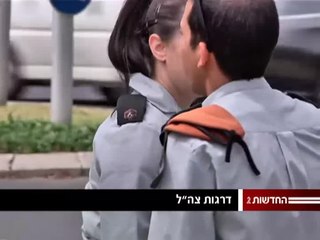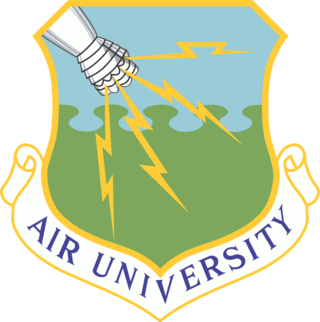
A non-commissioned officer (NCO) is a military officer who does not hold a commission. Non-commissioned officers usually earn their position of authority by promotion through the enlisted ranks. In contrast, commissioned officers usually enter directly from a military academy, officer training corps (OTC) or reserve officer training corps (ROTC), or officer candidate school (OCS) or officer training school (OTS), after receiving a post-secondary degree.

A chief master sergeant is the military rank for a senior non-commissioned officer in the armed forces of some countries.

James Mark McCoy was the sixth Chief Master Sergeant of the Air Force, serving from 1979 to 1981.

The ranks in the Israel Defense Forces (IDF) reflect an individual's level in the military.

Air University is a professional military education university system of the United States Air Force. It is accredited by the Commission on Colleges of the Southern Association of Colleges and Schools to award master's degrees.

A military reserve force is a military organization whose members (reservists) have military and civilian occupations. They are not normally kept under arms, and their main role is to be available when their military requires additional manpower. Reserve forces are generally considered part of a permanent standing body of armed forces, and allow a nation to reduce its peacetime military expenditures and maintain a force prepared for war. During peacetime, reservists typically serve part-time alongside a civilian job, although most reserve forces have a significant permanent full-time component as well. Reservists may be deployed for weeks or months-long missions during peacetime to support specific operations. During wartime, reservists may be kept in service for months or years at a time, although typically not for as long as active duty soldiers.

The senior enlisted advisor to the chairman of the Joint Chiefs of Staff (SEAC) is the most senior non-commissioned officer (NCO) position overall in the United States Armed Forces. The SEAC is appointed by the chairman of the Joint Chiefs of Staff to serve as a spokesperson to address the issues of enlisted personnel to the highest positions in the Department of Defense. As such, the SEAC is the primary enlisted advisor to the chairman, and serves at the pleasure of the secretary of defense. The SEAC's exact duties vary, depending on the chairman, though the SEAC generally devotes much of their time traveling throughout the Department of Defense, to observe training and communicating to service members and their families. The SEAC's normal term of assignment runs concurrently with the chairman, but an incumbent may be reappointed to serve longer. The first member to hold this post was William Gainey. The current SEAC is Troy E. Black, USMC who assumed the duties on 3 November 2023.
The Soldier Support Institute (SSI) at Fort Jackson, South Carolina is a U.S. Army organization and major subordinate command of the Combined Arms Support Command and part of the Sustainment Center of Excellence (SCoE). It is also part of the Training and Doctrine Command (TRADOC).

All branches of the United States Armed Forces use the general term Enlisted Professional Military Education (EPME) to describe the formal system of education which each branch provides to its enlisted personnel. Each branch has its own system and sequence of courses, with the overall focus on leadership and management. Education generally increases in intensity and level of knowledge as individuals progress in rank and assume broader leadership roles. EPME is distinct from the technical training which service members receive for their Military Occupational Specialty (MOS), Air Force Specialty Code (AFSC), or Navy Rating.

The I.G. Brown Training and Education Center is a detachment of the Air National Guard Readiness Center and is located at McGhee Tyson Air National Guard Base near Knoxville, Tennessee. The TEC conducts an average of 16 Enlisted Professional Military Education courses and 40 Professional Continuing Education sessions throughout the year. Typically, the TEC accommodates 11,000 service members on campus annually from the Total Force, United States Coast Guard, and partner nation armed forces. TEC also manages the ANG's Warrior Network; a $7 m satellite broadcast enterprise with more than 186 downlink sites, providing training, education and command information nationwide. In addition, the studio and multimedia facilities support ANG video productions, senior leader conferences and general-to-career field-specific training.

An officer is a person who holds a position of authority as a member of an armed force or uniformed service.

Kaleth O. Wright is a retired senior noncommissioned officer in the United States Air Force who served as the 18th Chief Master Sergeant of the Air Force from February 17, 2017, to August 14, 2020. In this post he served as the personal adviser to the Chief of Staff and the Secretary of the Air Force on all issues regarding the welfare, readiness, morale, and proper utilization and progress of the enlisted force. Wright is the second African American to serve in this position. Wright is often referred to by the nickname “Enlisted Jesus” by airmen on the internet due to his successful advocacy and reforms on behalf of enlisted personnel.

The United States Space Force (USSF) is the United States Armed Forces' space service and one of the eight uniformed services of the United States. It is one of two independent space forces in the world, alongside the Chinese People's Liberation Army Aerospace Force.

The chief master sergeant of the Space Force (CMSSF) is the senior enlisted advisor to the chief of space operations and the secretary of the Air Force. The chief master sergeant of the Space Force is the most senior enlisted guardian in the U.S. Space Force, unless an enlisted guardian is serving as the senior enlisted advisor to the chairman.

John F. Bentivegna is a United States Space Force chief master sergeant who serves as the second and current chief master sergeant of the United States Space Force. He previously served as the senior enlisted advisor to the deputy chief of space operations for operations, cyber, and nuclear and senior enlisted leader of Space Operations Command.

The United States Space Force is organized by different units: the Space Staff, the field commands, and the space deltas.
The military ranks and insignia of Chile are the military insignia used by the Chilean Armed Forces.

Space Delta 13 is a United States Space Force unit responsible for space education. It offers advanced and developmental space education courses for the Space Force and its joint and allied partners. It was established on 23 August 2021 following the establishment of the Space Training and Readiness Command, the field command to which it reports. It is temporarily headquartered at Maxwell Air Force Base, Alabama, but its final location requires a base selection process.

A deputy chief of space operations is a senior leadership position in the United States Space Force. There are four deputy chiefs of space operations in the Space Force, staffed either by a lieutenant general or a senior executive service personnel. They are the service's equivalent to the Army's and Air Force's deputy chiefs of staff, the Marine Corps' deputy commandants, and the Navy's deputy chiefs of naval operations. They are part of the Office of the Chief of Space Operations and hold office at the Pentagon.



















